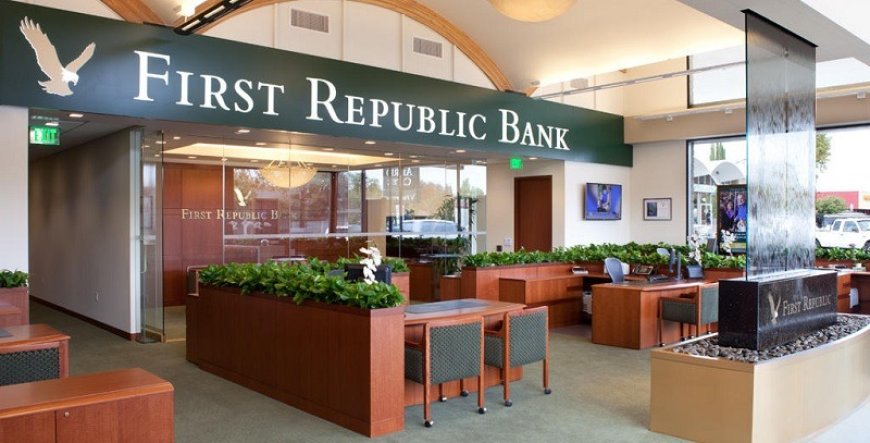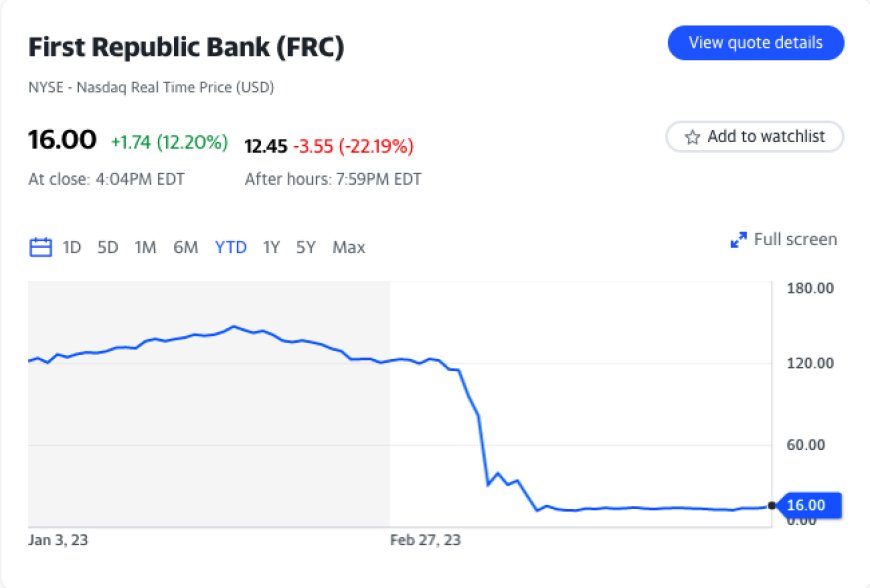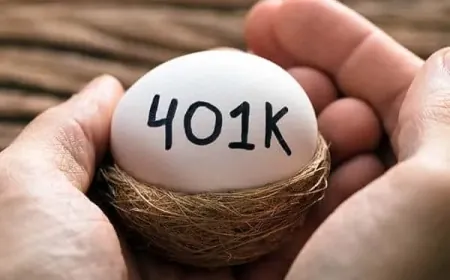Bank Turmoil Results in $72 Billion Loss of Deposits for First Republic
Bank turmoil averted: 11 major banks rescue First Republic from $100 billion deposit outflow"

On Monday, First Republic (FRC) reported a net loss of $72 billion in deposits for the first quarter, which would have exceeded $100 billion without assistance from 11 of the largest banks in the country. This occurred after depositors withdrew their funds from the San Francisco-based bank following the failure of Silicon Valley Bank on March 10, causing panic and leading them to seek the perceived safety of larger financial institutions.
To survive the crisis, First Republic resorted to several measures, such as borrowing from the Federal Reserve, securing $30 billion in uninsured deposits from 11 major banks, and seeking guidance from advisors to explore various options, including a potential sale.
Despite receiving $30 billion in deposits from 11 rival banks, First Republic's total deposit balance dropped by 41% during the first quarter to $104.4 billion, as per its earnings report released on Monday. In the absence of the additional infusion from the rival banks, First Republic's net outflow would have been a staggering $102 billion. The actual outflow was much higher than anticipated.
First Republic's stock tumbled in after-hours trading after the company's recent disclosures, causing it to drop as much as 21%. This has resulted in the stock plunging more than 85% since January. However, on Monday, the trading day closed with a 12% increase.
According to Jason Benowitz, the Associate Partner at CI Roosevelt, the future of First Republic is highly uncertain due to the significant loss in deposits. The company will have to replace the lost funding, and the only way to do so is by borrowing, which will weigh heavily on their profitability in the short term and going forward.
According to a statement released on Monday, First Republic Bank reported that deposit outflows began to level off the week of March 27 and have remained steady through April 21. The bank's balance as of Friday was $102.7 billion, which is a decrease of 1.7% since the end of the quarter. The bank attributed this decline to seasonal tax payments made by its clients.
On Monday, First Republic announced its plans to boost the amount of deposits insured by the Federal Deposit Insurance Corporation (FDIC), reduce its borrowings and loan balances, and cut its workforce by 20-25% in the second quarter. These steps are aimed at reducing its reliance on uninsured depositors and improving its financial stability following the significant outflows it experienced in the first quarter of the year.
First Republic CEO Michael Roffler stated on a conference call after the release of the results, "Despite the uncertainty of the past two months, and while average account sizes have decreased, we have retained over 97% of client relationships that banked with us at the start of the first quarter." However, the company did not take questions from analysts during the call.

During the first quarter, several regional banks disclosed outflows of deposits, though none as significant as First Republic's. Credit Suisse, a Swiss banking behemoth, also announced on Monday that its customers had withdrawn around $75 billion in deposits in the same period.
Amid the rising interest rates, First Republic and other regional banks are struggling to adapt as deposit costs increase across the industry, while loan margins shrink. According to the company's first-quarter earnings report, it earned $269 million, which is a 30% decrease from the fourth quarter and a 33% drop from the same period a year earlier.
The net interest income of First Republic, which is the difference between what the bank earns on its loans and what it pays for its deposits, declined by 21% from the fourth quarter and 19% from the first quarter of 2022.
Moody's, a leading credit rating agency, recently downgraded First Republic's preferred stock rating along with 10 other regional banks due to the worsening operating environment and funding conditions for US banks. The downgrade reflects concerns about the bank's ability to maintain profitability in the face of rising deposit costs and shrinking loan margins. This is a blow to the bank's reputation and may impact its ability to attract investors in the future.
First Republic disclosed its account of the events that happened in March for the first time on Monday. According to the bank, as of March 9, the day before Silicon Valley Bank was seized by regulators, its deposits were $173.5 billion, which was only slightly lower than the year-end total. However, on March 10, the bank experienced "unprecedented deposit outflows."
Following the deposit outflows triggered by the failure of Silicon Valley Bank, First Republic started borrowing money from various sources, including the Federal Reserve, JPMorgan Chase, and the Federal Home Loan Bank. The bank's borrowings reached a peak of $138.1 billion on March 15, while it had $34 billion in cash. On the following day, the bank received a deposit infusion of $30 billion from 11 other banks.
First Republic stated that the deposit infusion from the 11 rival banks enabled it to decrease its short-term borrowings. As a result, by April 21, the total borrowings had decreased to $104 billion. Additionally, it suspended the common and preferred stock dividends and eliminated executive bonuses.
First Republic's Chief Financial Officer, Neal Holland, stated in a release that the bank has been working to restructure its balance sheet, reduce its expenses, and lower its short-term borrowings. Holland also noted that the bank was able to secure additional liquidity by quickly leveraging its high-quality loan and securities portfolios.
The bank has been exploring several options since mid-March to restore stability, including raising capital or selling the company. On Monday, the bank announced that it is pursuing strategic options to expedite its progress and reinforce its capital position.
The banking industry research firm, Wedbush Securities, recently stated that First Republic faces a "Hobson's choice," leaving it with no other options than to continue operating as a standalone company. This is due to the large amount of unrealized losses that the bank has on its balance sheet, according to the firm.
Unrealized losses refer to losses that have not yet been realized because the assets have not been sold yet. As such, they are only potential losses and do not affect a company's income statement until they become realized losses. The decline in the value of assets, which has led to unrealized losses, can be attributed to the Federal Reserve's aggressive interest rate hikes. This has resulted in lower valuations of bank assets, and many other lenders also have billions of dollars in unrealized losses on their balance sheets.
According to Wedbush, even if First Republic were to be sold at $0 per share, it is unlikely that a buyer would be willing to acquire the bank because they would still have to bear the burden of paying billions of dollars to cover the unrealized losses on the bank's balance sheet.
Wedbush Securities predicted that First Republic will likely remain a standalone company, despite the challenges it faces. The research firm suggested that the bank could only be sold in the event of regulatory seizure and asset liquidation at a reduced price. However, Wedbush expects that First Republic will be able to avoid such a scenario and continue operating independently in the near future.
Wedbush Securities predicted that First Republic will likely remain a standalone company, despite the challenges it faces. The research firm suggested that the bank could only be sold in the event of regulatory seizure and asset liquidation at a reduced price. However, Wedbush expects that First Republic will be able to avoid such a scenario and continue operating independently in the near future.
Earlier this month, Carlyle Group co-founder David Rubenstein mentioned in an interview with Yahoo Finance that the federal government may need to provide some assistance for First Republic to find a buyer given the "hole" on the bank's balance sheet.
According to Vanda Research, everyday investors have invested $245 million in First Republic stock since the fall of Silicon Valley Bank, making it the third-highest inflow to a specific bank stock behind Bank of America and Charles Schwab (SCHW).
According to analytics firm S3 Partners, First Republic has one of the highest levels of interest among short sellers, who are betting on the stock to decline. Over the last 30 days, these bets account for $480 million. Despite this, everyday investors have bet $245 million on First Republic stock since the fall of Silicon Valley Bank, making it the third highest inflow to a specific bank stock behind Bank of America and Charles Schwab (SCHW), according to Vanda Research. Vanda also noted that First Republic "will be a bellwether of sentiment for the sector."

































































